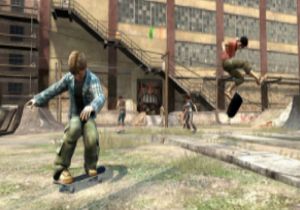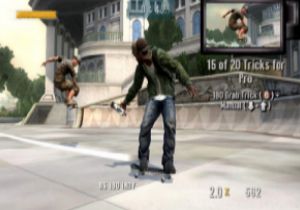Taking
the enormously popular skating franchise into another new direction, Tony
Hawk's Project 8 gives you the opportunity to build up your skills until
you've reached an elite level and earn an invitation to the super-star's
skating team. The game's massive worlds and non-linear structure offer
players plenty of freedom, but the real innovation comes in the new slow
motion nail the trick mode which allows you to perform moves in slow
motion. Unfortunately, this version falls short in the graphics
department, looking like an upscaled version of previous titles. Additionally,
the poorly executed Sixaxis controller support makes for a title that
doesn't live up to expectations.
At this point, it's probably safe to say
that the Tony Hawk series has gone in so many directions and added so many
elements that the basic premise seems to be in danger of getting lost in
its own elaborate back stories and gimmicks. This was apparent to anyone
who played last year's American Wasteland, which felt a bit desperate
especially after the declining quality of the two Underground titles. With
Tony Hawk's Project 8, Activision and long time series developer Neversoft
have pressed the reset button and gone back to basics in many regards. The
special guest stars, gimmicks and nonsensical plots that plagued the last
few games are gone, as is the majority of the role-playing elements.
Instead, this title's biggest feature emphasizes the players' skill in
performing tricks, while still offering an expansive world to explore and
several new tricks to nail. There's still some role-playing with extensive
player customization options and many new upgradeable tricks to enhance
your character throughout the course of the game. This definitely feels a
lot closer in tone and presentation to the earlier Pro Skater titles,
which is a positive since the series was definitely in danger of becoming
a parody of itself over the past few installments.
The biggest new feature in Tony Hawk's
Project 8 is the addition of a new 'nail the trick' mode where players can
slow down the action and perform tricks in a kind of bullet time, allowing
you to create fantastic combos and tricks you couldn't ordinarily pull off
in real time. This is a pretty cool feature and though it takes a lot of
practice to get the hang of these techniques, it does add a significant
new layer of strategy to the gameplay, adding an entirely new element to
the game. You can create unimaginable combos and tricks, change your
position and perform a perfect landing with little effort. Being able to
pull of these moves is critical to earning the high scores and stoke
points needed to progress through the levels and unlock additional
content. The basic elements like jumping ollies, grabs and grinds have
remained largely unchanged, with the same basic set of intuitive controls
players have come to expect from previous installments. Most players
should be able to get the hang of the new game quickly with little effort.
Project 8 uses the new Sixaxis controller in two ways, you can use it as
you would have a standard dual shock, which offers a very familiar
experience that doesn't offer much new. However, you can also choose to
use the tilt-functionality to perform spins, steers and jumps by twisting
the controller around. This takes a lot of getting used to before you gain
an adequate proficiency, but it still doesn't have the same intuitiveness
as the standard interface does making the play more frustrating than
invigorating. The poorly thought out implementation is quite disappointing
and makes keeping your balance while performing tricjs an almost
impossible task.
 Players
begin in a small neighborhood and can unlock additional areas by
performing tricks and beating the tasks they find by talking to
characters. These are relatively simple to complete and quickly unlock a
much larger area of the game where you can explore a downtown, purchase
items in Skate shops. You also quickly gain attention and sponsorship
money by performing tricks for video-camera toting characters as well. As
you gain experience and pull off tricks, you'll earn extra points that can
be used to purchase additional boards and clothes for your character.
There are loads of boards and other items you can purchase throughout. The
main way to progress is to beat the challenges which come in many
different styles and approaches. Some of these are simple timed exercises
where you have to perform a type of trick, while others act as training
missions where you are given the basics. There are also spot challenge
tricks where you find a spray marker and have to beat the mark set by
another skater. These are fairly random and can occur at any point in the
game's world. Fans of the early THPS games will also be happy to find
several 'classic' style challenges on each level where you have to beat a
score, knock down objects or collect letters in a timed mode. Project 8
unfolds in a linear manner but gives the player multiple paths to reach
that point. Successfully completing these challenges earns you points and
allows you to access more challenges and also unlocks additional hidden
skaters, videos and other options that opens Project 8's world up even
more, giving players plenty of room to explore and find hidden areas. This
makes for a game with plenty of depth, but most of what you find isn't
that impressive, which reduces your motivation to keep playing.
Players
begin in a small neighborhood and can unlock additional areas by
performing tricks and beating the tasks they find by talking to
characters. These are relatively simple to complete and quickly unlock a
much larger area of the game where you can explore a downtown, purchase
items in Skate shops. You also quickly gain attention and sponsorship
money by performing tricks for video-camera toting characters as well. As
you gain experience and pull off tricks, you'll earn extra points that can
be used to purchase additional boards and clothes for your character.
There are loads of boards and other items you can purchase throughout. The
main way to progress is to beat the challenges which come in many
different styles and approaches. Some of these are simple timed exercises
where you have to perform a type of trick, while others act as training
missions where you are given the basics. There are also spot challenge
tricks where you find a spray marker and have to beat the mark set by
another skater. These are fairly random and can occur at any point in the
game's world. Fans of the early THPS games will also be happy to find
several 'classic' style challenges on each level where you have to beat a
score, knock down objects or collect letters in a timed mode. Project 8
unfolds in a linear manner but gives the player multiple paths to reach
that point. Successfully completing these challenges earns you points and
allows you to access more challenges and also unlocks additional hidden
skaters, videos and other options that opens Project 8's world up even
more, giving players plenty of room to explore and find hidden areas. This
makes for a game with plenty of depth, but most of what you find isn't
that impressive, which reduces your motivation to keep playing.
While these gameplay innovations and
changes are a welcome change of pace, the Playstation 3 edition of the
game falls a bit short in its visuals, which don't offer the next-gen feel
that you would expect them to. Some areas of the game feel sharp and clear
with excellent surface detail and reflections, but the character models
themselves still seem blocky and unnatural. They don't have a sense of
fluidity that they should. The many areas of the game feel a bit barren
and lack enough NPC's to really feel convincing. Some of the area layouts
and maps are interesting, but most of the game appears a bit flat and
uninteresting. A somewhat predictable presentation is forgivable, but the
unimaginative levels offer the same skate parks, suburban installations
and high schools we've seen far too much of over the years. Its washed out
color-palette makes things feel less interesting than it should and lacks
the vibrancy that characterized the last few games. These visual flaws are
all the more apparent on today's high definition sets, and this definitely
has the feel of a port, not an indigenous release on the Playstation 3.
Adding to the 'cynical filler' vibe, Project 8's ramps and jumps are
fairly predictable in placement and approach, and even the ability to
change the position on the fly doesn't help things that much. The game's
soundtrack offers a decent selection of pop-punk, hip-hop and metal but
quickly feels more like background noise than a real compliment to the
onscreen action. A series of short videos and cameos from pro skaters,
including Hawk himself adds some currency to the game, but in the end, it
really doesn't add to much aesthetically to the franchise.
 Aside
from the tilt-functionality (which is more gimmicky than interesting) and
slow motion tricks mode (which is more gimmicky than useful) Tony Hawk's
Project 8 doesn't really offer much that you haven't seen before. The
levels are large, but they don't really have much of interest to see,
which is a real shame. While the larger areas are impressive, the game
falls short from a visual standpoint and feels more like a scaled-up
version of the games you've been playing for more than a decade. Its
appearance feels slipshod and the flaws in its graphics engine are readily
apparent in HD. Adding to the game's problems are the long load times
between levels which hurts the flow of your overall experience. While
these incremental steps forward might have been enough to pull the series
forward on older platforms, Tony Hawk's Project 8 falls short on the
Playstation 3 and fails to deliver a truly next-generation experience. In
the end, the game is somewhat entertaining for a short time, but the
awkward tilt controls, uninspiring presentation and unimaginative design
leaves a lot to be desired making this a disappointing experience that
doesn't meet its potential.
Aside
from the tilt-functionality (which is more gimmicky than interesting) and
slow motion tricks mode (which is more gimmicky than useful) Tony Hawk's
Project 8 doesn't really offer much that you haven't seen before. The
levels are large, but they don't really have much of interest to see,
which is a real shame. While the larger areas are impressive, the game
falls short from a visual standpoint and feels more like a scaled-up
version of the games you've been playing for more than a decade. Its
appearance feels slipshod and the flaws in its graphics engine are readily
apparent in HD. Adding to the game's problems are the long load times
between levels which hurts the flow of your overall experience. While
these incremental steps forward might have been enough to pull the series
forward on older platforms, Tony Hawk's Project 8 falls short on the
Playstation 3 and fails to deliver a truly next-generation experience. In
the end, the game is somewhat entertaining for a short time, but the
awkward tilt controls, uninspiring presentation and unimaginative design
leaves a lot to be desired making this a disappointing experience that
doesn't meet its potential.
Grade: B-

